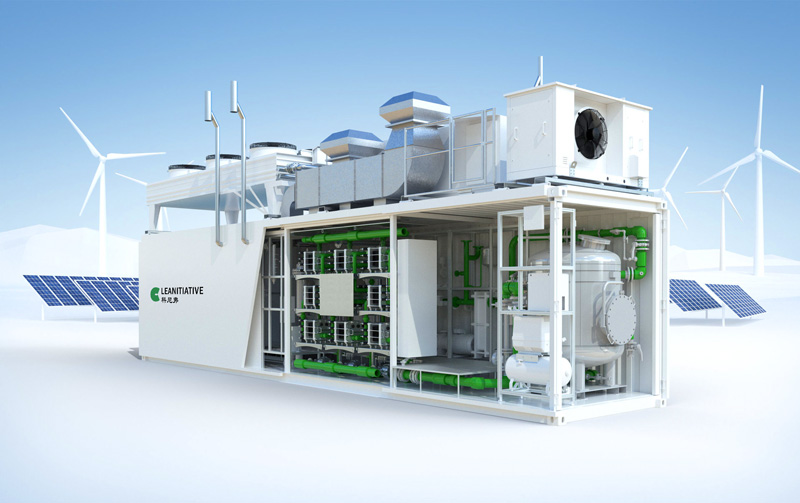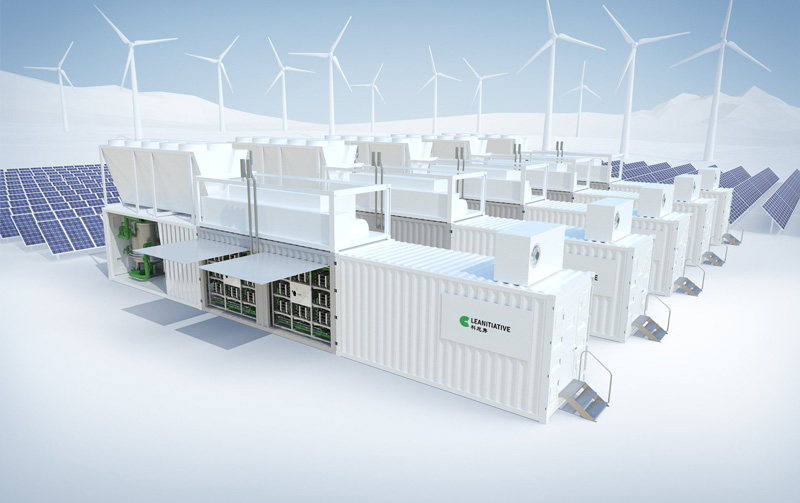PEM Water Electrolysis for Hydrogen production system
Time:2023-02-03 13:44:50View:2057
German CLEANITIATIVE’s PEM water electrolysis for hydrogen production equipment is a powerful modular hydrogen production system that minimizes risks and costs through a multi-stack, modular and extensible design. The system is mainly composed of proton exchange membrane reactor, water treatment and electrical controls, and is integrated in a 40-inch container. It can be installed indoors or outdoors according to user’s requirements. Its maximum capacity: producing 4,920 Nm³/h hydrogen with a purity of 99.9998%, which is the best choice for various industrial, fuel and renewable energy applications. Our company has provided more than 3,000 sets of hydrogen production systems with various specifications to users all over the world, which has been proven to be a reliable, economical and efficient turnkey solution for green hydrogen production.
WORKING PRINCIPLE

SYSTEM FEATURES
1. Pure water electrolysis is adopted, which is pollution-free and corrosion-free, and the hydrogen purity is high;
2. This hydrogen production system with low conversion cost, optimal integration and high efficiency, makes green hydrogen production more economical and efficient;
3. The user’s actual hydrogen demand can be realized through modularization, flexible expansion and regulation of the system.
4. Corrosive chemicals and corrosive chemical electrolytes are not used in the hydrogen production process, so the production is more green and environmentally friendly;
5. This system with low maintenance cost, compact structure, low noise, convenient installation and is less limited by installation space.
TECHNICAL PARAMETER
| SPECIFICATIONS | ||||||
|---|---|---|---|---|---|---|
| Model | HE250 | HE500 | HE2000 | HE3000 | HE4000 | HE5000 |
| Net Production Rate | ||||||
| ① Nm³/h | 246 Nm³/h | 492 Nm³/h | 1,968 Nm³/h | 2,952 Nm³/h | 3,936 Nm³/h | 4,920 Nm³/h |
| ② kg/24 h | 531 kg/24 h | 1,062 kg/24 h | 4,247 kg/24 h | 6,371 kg/24 h | 8,495 kg/24 h | 10,618 kg/24 h |
| Production Capacity Dynamic Range | 10 - 100% | 10 - 100% | 10 - 100% | 10 - 100% | 10 - 100% | 10 - 100% |
| Average Power Consumption at Stack | 4.5 kWh/Nm³ | 4.5 kWh/Nm³ | 4.5 kWh/Nm³ | 4.5 kWh/Nm³ | 4.5 kWh/Nm³ | 4.5 kWh/Nm³ |
| Purity - with Optional High Purity Dryer | 99.9995% | 99.9995% | 99.9995% | 99.9995% | 99.9995% | 99.9995% |
| O₂-Content in H₂ | < 1 ppm v | < 1 ppm v | < 1 ppm v | < 1 ppm v | < 1 ppm v | < 1 ppm v |
| H₂O-Content in H₂ | < 5 ppm v | < 5 ppm v | < 5 ppm v | < 5 ppm v | < 5 ppm v | < 5 ppm v |
| Delivery Pressure | 30 barg | 30 barg | 30 barg | 30 barg | 30 barg | 30 barg |
| Dimensions | ||||||
| ① Footprint | NA | NA | Dependent upon configuration | Dependent upon configuration | Dependent upon configuration | Dependent upon configuration |
| ② Process Container – W x D x H | 12.2 m x 2.5 m x 3 m | 12.2 m x 2.5 m x 3 m | NA | NA | NA | NA |
| ③ Rectifier/Transformer Container – W x D x H | 6.1 m x 2.5 m x 2.6 m | 12.2 m x 2.5 m x 3 m | NA | NA | NA | NA |
| Ambient Temperature | -4 to 104ºF | -4 to 104ºF | 50-104º F | 50-104º F | 50-104º F | 50-104º F |
| Electrolyte | Proton Exchange Membrane (PEM) | Proton Exchange Membrane (PEM) | Proton Exchange Membrane (PEM) | Proton Exchange Membrane (PEM) | Proton Exchange Membrane (PEM) | Proton Exchange Membrane (PEM) |
| Feed Water Consumption | 0.9L/Nm3 | 0.9L/Nm3 | 0.9L/Nm3 | 0.9L/Nm3 | 0.9L/Nm3 | 0.9L/Nm3 |
APPLICATION
1. Driving equipment fuel
CLEANITIATIVE’s PEM water electrolysis hydrogen production equipment is zero-emission and pollution-free hydrogen production system. Mobility leaves a footprint - at least up to now. Hydrogen from our PEM electrolysis can be used directly for fuel cells and is therefore emission-free and climate-friendly. That makes traffic cleaner and quieter.
2. Decarbonization of domestic energy systems
Water electrolysis produces not only hydrogen, but also ca 50 °C heat as a by-product. This is valuable energy that can be fed into the district heating network or used directly to heat residential and commercial premises. Fuel cell heating systems also benefit from the principle of cogeneration.
3. Decarbonization of industrial processes
The production and processing of industry raw materials and goods, the hydrogen can be used as reducing agent and protective gas, which can greatly reduce the generationand emission of greenhouse gas (CO2), improve the industrial production process to be green and pollution-free, thus benefit some enterprises under the background of carbon neutrality, e.g. heating of kilns in glass, cement or steel production.
4. Raw material for synthetic industrial goods
Mixing hydrogen (H2) and carbon dioxide (CO2) produces a high-quality syngas. this is a pioneering process for capturing CO2 emissions and using them to produce the chemical building blocks for chemicals, polymers or synthetic fuels. Even the production of ammonia (NH3), the main ingredient for mineral fertilizers, is possible with climate-friendly green hydrogen.
5. Energy storage for balancing the power grid
Surplus electricity is converted into green hydrogen via electrolysis with water. This can be stored conveniently and over a long period of time in the natural gas grid or in tanks, and accessed again when renewables aren’t available.

Can I have your contacts?
Address: 12 Floor, Tian Xin Building, No.27, Feng Cheng Erlu Electrical and Technological Development Zone Xi'an, China, 710018
Tel: (+86) 029-86184112; (+86) 029-86184113
Mobile:
E-mail: webmaster@hajomech.com
CopyRight © 2025 HAJOMECH



